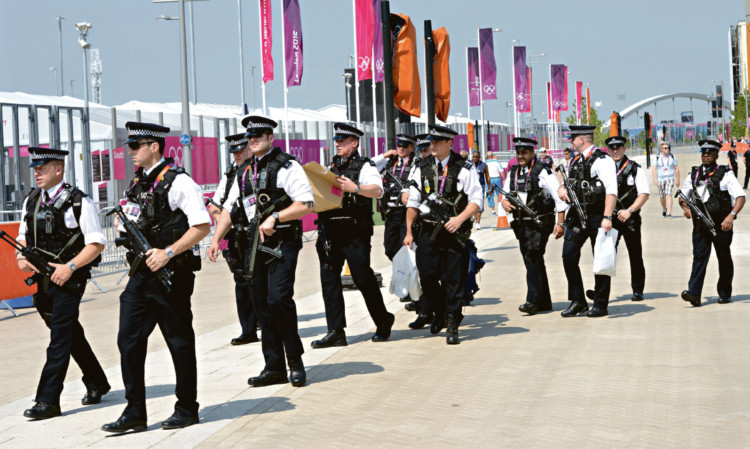
Concerns raised for Scotland’s momentous sporting year.
Half of Scotland’s top police chiefs don’t have the “mandatory” qualification needed for the job.
The senior Police Scotland officers have not passed a tough training course deemed essential for dealing with major incidents such as natural disasters or terror attacks.
It is understood four of the eight serving Assistant Chief Constables (ACCs) do not have the Strategic Command Course (SCC) qualification.
This is despite SNP ministers making the SCC mandatory for senior officers in 2008 and the three-month course being described as “essential” in the job advert for the £116,000-a-year ACC roles.
Among those without the top qualifications are Police Scotland’s counter terrorism lead and another senior officer making preparations for the Glasgow Commonwealth Games.
With Scotland also hosting the Ryder Cup this year, concerns have been raised about how well equipped the senior officers are if something goes wrong.
A police source said: “These courses are designed to make sure the top people are ready to lead in the event of major incidents.
“These are, on the whole, good people but can we be sure they are properly equipped if they’ve not got the right qualifications?
“This will hack off a lot of people in the force. You can’t become a sergeant without passing your sergeant’s exam so why should it be any different further up the tree?”
In 2008 the Scottish Government ruled the SCC would become a “mandatory qualification” for anyone applying to become an ACC or higher rank.
The 2012 job adverts for the new ACC roles in Police Scotland stated it is “essential” that applicants have successfully completed a relevant police SCC.
To gain access to the SCC, senior officers must have attended the Police National Assessment Centre (PNAC) and the original ACC job adverts for Police Scotland said any successful applicant should have the PNAC qualification.
Both Chief Constable, Sir Stephen House, and Scottish Police Authority board member, Iain Whyte, have been involved in the running of previous PNAC courses.
Police sources have told The Sunday Post that several serving senior officers do not have these qualifications.
ACC Ruaraidh Nicolson, responsible for combatting organised crime and terrorism, is understood to have neither the PNAC nor SCC.
The man in charge of local policing in West Scotland, ACC Wayne Mawson, has passed his PNAC but not the SCC.
Two further Police Scotland ACCs do not have the SCC but are only temporary appointments.
They are Campbell Thomson, who is charge of local policing in northern Scotland, and Derek Robertson, who is second in command for policing the Commonwealth Games.
Labour’s justice spokesman, Graeme Pearson, who has both the PNAC and SCC qualifications from his time as Director General of the Scottish Crime and Drug Enforcement Agency, said: “I think it is unfortunate that the service has not taken on the requirement for the SCC even though they said at the outset it was necessary for every senior officer.
“If the SNP minister and then the executive has decided it is a requirement, then it has to be applied.
“We are blessed with a group of skilled and experienced officers, but if you’re going to have a rule, as they do further down the hierarchy, then they have to stick to it or just get rid of it.”
A spokesman for the Scottish Police Authority said: “Based on the applications received in response to the ACC job advert, advice was taken from HMICS who deemed that other qualifications listed in applications could
be classed as ‘relevant’ to the SCC.
“The panel selected candidates for interview who were deemed to have met the minimum criteria.”
A Police Scotland spokesman declined to comment on what he described as a personal matter for the senior officers.
Talks over a revamp of the qualifications needed by Scotland’s senior police officers will get underway later this year. It is understood this could involve breaking away from the UK-wide qualifications and creating a Scottish-equivalent of the SCC.
However, there will be no movement until the outcome of September’s independence referendum is known. David O’Connor, President of the Association of Scottish Police Superintendents, said: “The feedback we have had from those attending SCC is that it does need to be revamped, made more fit for purpose, certainly for circumstances in Scotland.
“But any change also has to reflect the fact that many people already have the current qualifications and some will also still want the opportunity to serve outwith Scotland. We’re now more than a year into the new force and it is right we begin to look at this issue.”
Police Federation General Secretary, Calum Steele, added: “The most important consideration for any post within the police service, promoted or otherwise, should be the ability to perform the job. Whilst formal qualifications have a part to play in making that assessment, they should not be the be all and end all.”

Enjoy the convenience of having The Sunday Post delivered as a digital ePaper straight to your smartphone, tablet or computer.
Subscribe for only £5.49 a month and enjoy all the benefits of the printed paper as a digital replica.
Subscribe